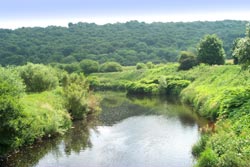Looking after the nature

Pressure to develop, land use changes and poor management of wildlife habitats means that Britain's wildlife remains under threat:
- 10 - 20% of our native species are struggling to survive!
There are many ways that you can help:
Plant a tree
Trees remove Carbon Dioxide (CO2) from the air. CO2 is a greenhouse gas that is causing climate change. Trees planted in the right place (not on habitats of existing wildlife value) can:
- Improve biodiversity, as they provide shelter and food for many living creatures.
- They can also remove other gaseous pollutants that are known to have serious impact on our health and environment.
- Screen out noise.
- Help to reduce flooding.
- Help prevent soil erosion.
- Recycle vast quantities of water and release it back into the air.
- Make an area more pleasing on the eye.
Visit: Treesponsibility (Slow The Flow).
Look after what is there
If you know of a tree or trees that you think needs protection, apply for a Tree Preservation Order.
For more about trees, visit: Tree Council.
Go wild
Create a new feature in your garden that will provide a habitat for wildlife, such as:
- A pond, which will attract frogs and dragonflies;
- or put up a feeder or a nesting box to entice birds.
For more information, visit: Wild about gardens.
Get involved
Why not try volunteering with Countryside Services?
Volunteers play a very important part in Calderdale's countryside management and help with many tasks, like:
- Habitat management.
- Tree planting.
- Wildlife surveys.
- Maintenance of public rights of way and way marking.
For details on some of the things you can get involved in, visit:
Say no to peat
Extraction of peat from lowland habitats, for use as compost/fuel, causes damage to the UK's most valuable wildlife habitats. It also contributes to climate change. (Peat bogs are important carbon sinks. When they are used for compost, fuel or drained for farming, CO2 is released. CO2 absorbs heat, causing average temperatures to rise with dire effects on the climate.)
There are other things available! Ask your local garden centre to supply peat-free compost or even better, make your own.
For more about this, visit: Recycle Now - composting.
Do not be a litterbug
Set a good example, do not drop litter and support community litter clean-ups.
If you have seen evidence of fly-tipping, report it to the Council: Report fly-tipping.
Choose good wood
Buy goods made from sustainable wood and help preserve the world's endangered forests. Look for: The Forest Stewardship Council (FSC) logo.
Think before you pour
Avoid putting oil, paint, varnish or solvent down the drain. It will often end up in a nearby river where it will do serious harm fish and other wildlife.
Contact
Environmental Management Team (Housing and Green Economy):
- Address: Floor 3, Princess Buildings, Halifax. HX1 1TS.
- Email: environment@calderdale.gov.uk.
- Phone: (01422) 392250.